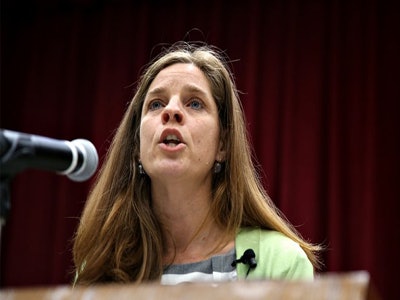Amid concerns that the U.S. Department of Justice under President Donald J. Trump will not pursue consent decrees to hold police departments accountable for use of excessive or deadly force, a law professor who negotiated consent decrees under President Barack Obama said the rights of minorities are at stake.
 Christy E. Lopez is a former deputy chief in the Special Litigation Section of the Civil Rights Division at the U.S. Department of Justice.
Christy E. Lopez is a former deputy chief in the Special Litigation Section of the Civil Rights Division at the U.S. Department of Justice.“It has been and should always be the role of the civil rights division to protect minority rights from infringement by the majority,” said Christy E. Lopez, Distinguished Visitor from Practice at Georgetown Law and former deputy chief in the Special Litigation Section of the Civil Rights Division at the U.S. Department of Justice (DOJ) under President Obama.
“You can’t just say, ‘Don’t violate the law.’ Courts have long recognized you don’t just say, ‘Don’t violate the law.’ That is not even allowed in a consent decree or an injunction in these cases,” Lopez said. “The law recognizes that you have to show them what do we need to do to make sure we don’t violate the law.”
Lopez said one of the most important ways to prevent excessive force — including deadly force — is to get police officers to have “more positive interactions with the people they police.”
“Where we can have more positive interactions between police officers and community members, you can create community trust that will not only bring crime down but will prevent those terrible outcomes,” Lopez said. “That’s why in the Ferguson consent decree and others, you see a redundancy of opportunities for positive interactions between police and community members.”
Lopez was referring to the 2016 consent decree with the City of Ferguson that followed the 2014 fatal police shooting of 18-year-old Michael Brown that sparked nationwide protests.
Lopez’s remarks — made Thursday during a New America panel discussion titled “Policing in a New Political Era” — come in the wake of remarks by U.S. Attorney General Jeff Sessions during his confirmation hearings that consent decrees “undermine the respect for police officers.”
More recently, Sessions lamented that, in recent years “law enforcement as a whole has been unfairly maligned and blamed for the unacceptable deeds of a few bad actors.”
Sessions said that, to confront “challenge of rising crime, we must rely heavily on local law enforcement to lead the way — and they must know they have our steadfast support.”
“For the federal government, that means this: rather than dictating to local police how to do their jobs — or spending scarce federal resources to sue them in court — we should use our money, research and expertise to help them figure out what is happening and determine the best ways to fight crime,” Sessions told the National Association of Attorneys General during their annual winter meeting.
While Lopez said the public should pressure the DOJ to “stay active,” Robert Driscoll, who served as deputy assistant attorney general of the Civil Rights Division in the DOJ under President George W. Bush, said during Thursday’s panel that people should expect “less of the DOJ being a lever of preference of change” and more of being a “straight constitutional enforcement regime.”
He said in too many cases where communities were concerned about a police action or a deadly police shooting, there’s a sense of a “need to do something.”
“And anyone who’s experienced in this areas knows you can’t really bank on a federal indictment on a shoot-don’t shoot case,” Driscoll said. “They just rarely, rarely happen.”
Much of Thursday’s panel was devoted to exploring how the evolution of police departments in the United States is rooted in race and the “policing of color” — from the slave patrols of the 1800s to the civil unrest of the 1960s and contemporary protests.
Justin Hansford, visiting associate professor of law at the Georgetown Law Center and associate professor of law at the Saint Louis University School of Law, said he didn’t invest much stock in the notion that training would make a difference in how police officers treat African-Americans.
“I tend not to credit much of the training discussion because most of the officers, when they go into nicer neighborhoods, they magically know how to comport themselves with a great deal of respect,” Hansford said. “They know how to deescalate when they’re on college campuses and they somehow forget when they go to the Fergusons and the low-income communities.”
But Lisa D. Robinson, president of the Vanguard Justice Society, Inc. — an organization that advocates on behalf of Black officers — and a lieutenant with the Baltimore Police Department, said other factors are at play.
She said officers are cognizant of the fact that, in more affluent areas, people are apt to call the police when they see suspicious behavior, whereas in urban areas with high amounts of violence, a person might not cooperate with the police even when a family member has been shot.
“It’s not just about Black and White,” Robinson said. “As a Black police officer, I know when I engage someone from the first word of the conversation and the vibe, whether I have to take this to a different level.”
Jamaal Abdul-Alim can be reached at [email protected] or you can follow him on Twitter @dcwriter360.





















